quinn hughes
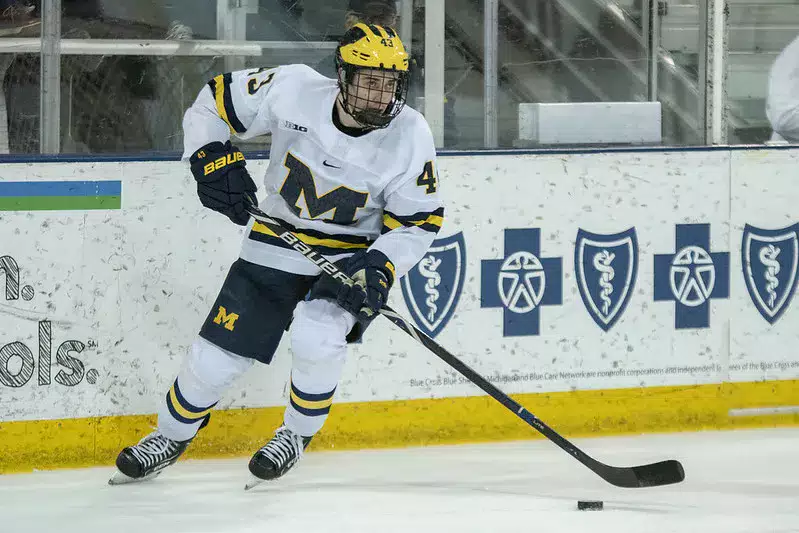
It's been a couple years since I last wrote a "Wolverines in the NHL" update. David and I have done a segment during the season on the HockeyCast devoted to it the last couple years, but a written piece can have a wider reach and can also be more expansive. Also, since the NHL regular season recently ended, I figured this was a proper time to do it, rather than in the middle of the season like our podcast segment. With the recent explosion of Michigan players heading to professional hockey, this year's update is longer than ever, so it's being broken into two pieces. Today is Part 1, where we'll cover the established NHLers, the studs, complementary players, and role players. Tomorrow will be updates on the younger NHLers, recent retirees, and all the alumni who have fallen short of the NHL but are still playing pro hockey somewhere in the world:
The Studs
These are the players who are considered high end, All-Star caliber. They are one of the three or so best players on their given teams and are getting paid premium money in the NHL:
Quinn Hughes, D, Vancouver Canucks: Already the best defenseman from the University of Michigan to ever play in the NHL, Hughes is likely to set a new milestone (when the awards are announced in June), becoming the first Michigan alumni to ever win the Norris Trophy for the NHL's best defenseman. Michigan State (Duncan Keith), Harvard (Adam Fox), UMass (Cale Makar), Bowling Green (Rob Blake), Boston College (Brian Leetch), and Wisconsin (Chris Chelios) have all produced a Norris winner... it's about time that Michigan got one. Hughes is likely to do it, the capstone of a marvelous season that saw him score 17 goals and 75 assists for 92 points, leading the NHL in the latter two categories for defensemen (he was tied for 6th with 17 goals by a D).
Hughes became one of 12 defensemen in NHL history to ever score 90+ points in a season, which is what will likely cement his Norris case. Hughes is the engine for everything that the resurgent Vancouver Canucks do, helping the team win their division for the first time in nearly a decade. He's a dynamic offensive force and a puck possession monster who drives play over all 200 feet, which allowed the Canucks to outscore opponents 92-55 with Hughes on ice at 5v5 this regular season(!!). A brilliant passer who has evolved significantly as a shooter and defender during his NHL career, Hughes is a no doubt top five defenseman in the NHL during his age 24 season.
Dylan Larkin, C, Detroit Red Wings: Few players in the NHL may be as linked to their team's wins and losses as Dylan Larkin is to the Red Wings. Anyone who followed Detroit's season knows that, a team that seemed to be headed to the postseason before an injury to Larkin in March submarined their season. The team looked almost unrecognizable without Larkin and it's not surprising why that's the case. The Red Wings captain potted 33 goals this season, the best goals-per-game mark of his career (coming in just 68 games). He also finished above 1.00 points-per-game this season for the first time in his career, probably reaching his apex at 27 and that's fine. Larkin's a very good NHL player, an important leader off the ice and a speedy playdriver with good offensive talent on the ice, playing a premium position with legit finishing talent. Though perhaps not a superstar of the Quinn Hughes variety, there are no teams in the NHL that would turn down the opportunity to put Larkin on their roster.

[Bill Rapai]
Zach Hyman, LW, Edmonton Oilers: I listed Hyman as a complementary piece the last time I did this article, which is still probably true in the abstract (in the sense that he complements his team's superstars), but when you score 54 goals, you have to go in the stud category. That's what Hyman did this season, blowing by his career high goal total by a full 18 goals en route to a staggering total that ranked 3rd in the NHL The three seasons since Hyman signed in Edmonton has seen his goal total increase in linear fashion, from 27 to 36 to 54, this season being the apex of the 31-year-old's career. Hyman is simply the perfect fit to play alongside the NHL's best offensive player, Connor McDavid. He posts up around the net and gets fed the puck, shots in tight, tips, deflections. Very few of Hyman's 54 goals have come outside of ~5 feet from the crease, with 15 of his goals coming on Edmonton's devastating power play. It may be true that Hyman wouldn't score that many goals on a team sans McDavid and Leon Draisaitl, but the skill and hockey talent of Hyman is now undeniable. He's a really good NHL forward.
Kyle Connor, LW, Winnipeg Jets: Two years ago when I wrote this piece Connor was coming off of a season akin to what Hyman has done this season, scoring 47 goals for the Winnipeg Jets. His two seasons in the meantime have fallen short of that mark but Connor remains a high level NHL goalscorer. Connor has now played seven real NHL seasons and has scored 30 goals or at a 30+ goal pace (in the case of the 56 game COVID shortened season) in all seven of them. He remains a pretty nonexistent defensive player, instead a one-dimensional rush scorer but when you average ~38 goals per 82 games over a seven season period, it doesn't much matter what else you do. You're a legit stud.
Zach Werenski, D, Columbus Blue Jackets: Not a ton has changed for Werenski since the last time we updated this article. He remains a very good offensive defenseman, scoring 57 points this season (ranking 12th in the NHL by a defender) in 70 games. This was the most games that Werenski has played in a season since 2018-19, as injuries continue to minorly hamper him, but his play remains pretty consistent. Werenski plays on a bad team, puts up a good number of points, generally wins his minutes, and collects a huge paycheck (still earning $9.5 M annually, near the top in the league). Werenski's not an elite defenseman, but he's a good top pairing puck mover.
[AFTER THE JUMP: more players]
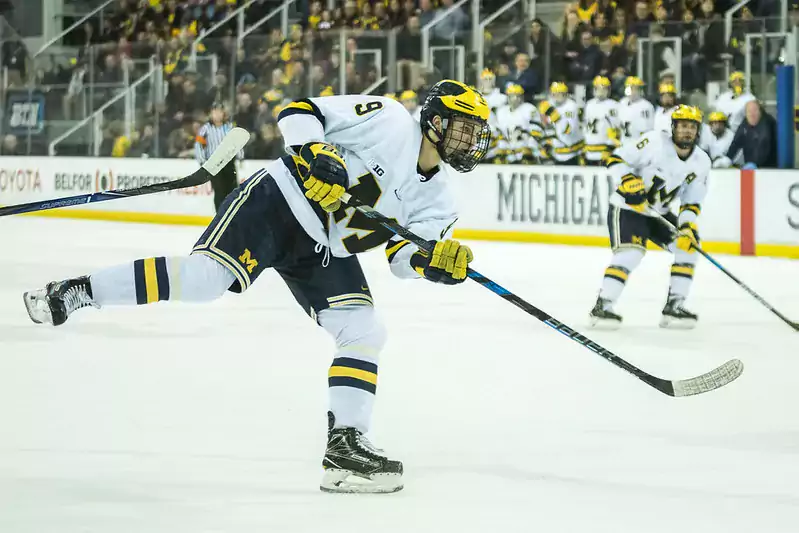
It's offseason content time and with few current Michigan athletes to talk about, I thought it would be a good idea to check in on some from the past. We did this exercise as a HockeyCast episode last year and this time I decided to do it in written form. We're going to check in on the Michigan Hockey alumni from the past who are competing in the NHL to see how they're doing. I've structured it based on what category of player they fit into and at the end I'll also shoutout a few guys who are still playing in the minor leagues:
The Studs
These are the players who are considered high end, All-Star caliber. They are one of the three or so best players on their given teams and are getting paid premium money in the NHL:
Quinn Hughes, D, Vancouver Canucks: Hughes had a bounceback season, setting career highs in points and assists with an 8-60-68 line. The point total ended up being a franchise record for points in a single season by a defenseman, and he finished the season tied for 6th in points by a defenseman league-wide. Hughes is a premier puckrushing defenseman who sacrifices a good bit of defense to produce an offensive output that few other blueliners can match. He signed a contract extension in the fall that will last for six years and total $47.1 M. At only 22 years old, it feels very likely that he will be worth that deal. Hughes is a building block for a Canucks organization that is looking to re-tool and return to contention.
Dylan Larkin, C, Detroit Red Wings: Larkin is another player who had a career year, riding the wave of higher offensive outputs across the NHL to score a 31-38-69 line in just 71 games. Though none of those three totals were technically career highs, on a per-game basis, his goals and points clip were career bests. At age 25, this is about Larkin's peak, a very good 1.5C, not the ideal first line center on a championship team, but also a well above average second line center. He is entering the final year of his contract, at $6.1 M per season. The Red Wings, who have made Larkin their captain, have an interesting decision to make about how he fits in with future pieces who are substantially younger like Lucas Raymond and Moritz Seider.
Josh Norris, C, Ottawa Senators: Norris had one of those seasons where you look at his numbers and say "Josh Norris scored 35 goals??!??". In fairness, you could say that about many players in the NHL with the way scoring was up, but regardless, the third season in the league was the charm for Norris. He used his excellent shot to become a power play demon, racking up 16 PPGs, which was good for third-best in the NHL (!), tied with superstar snipers like Auston Matthews and Steven Stamkos (!!). Moreover, Norris did this in just 66 games. Having just turned 23, Norris is an important piece of the Senators' young core as they look to return to the playoff picture. He is a restricted free agent this summer and will be in line for a healthy extension and considerable pay raise.
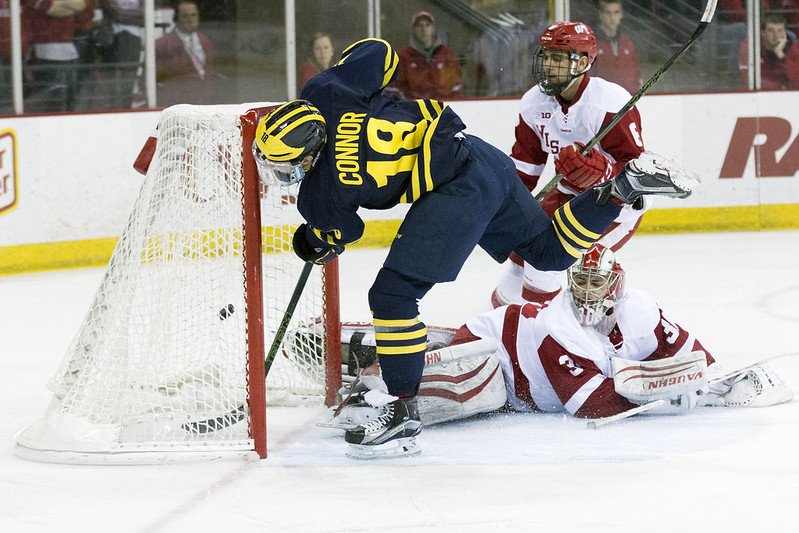
[Patrick Barron]
Zach Werenski, D, Columbus Blue Jackets: Werenski didn't have massive totals in the counting stats that some of these other players did, but he is still a high-end puckrushing defenseman that a lot of teams would love to have. Werenski put up 48 points in 68 games on the middling Blue Jackets, the highest scoring defenseman on that team by a country mile. He also has his defensive deficiencies, but he drives play and can create offensively at a superb level that makes it well worth it. Werenski is locked up in Columbus (sounds like Hell to me) for the long-term, as next year begins his monster six-year extension that will pay him $9.58 M per season (!!), making him one of the highest paid defensemen in the NHL.
Kyle Connor, LW, Winnipeg Jets: Connor had a year a lot like Norris, hitting a goal total that is somewhat shocking when looked at with a bird's eye view. Connor shoveled in 47 goals (!!) and 46 assists for 93 points (!). He finished tied for 5th in the NHL in goals and 13th in points, a staggeringly productive campaign, even on a Winnipeg team that fell far short of expectations. The Jets are likely to make some degree of substantial changes in the offseason but Connor feels like one of the only untouchable pieces on the roster. He continues to do most of his damage off the rush and on the power play, while playing very little defense, but when you score at the level he did, it doesn't really matter. At age 25, this is Connor at his peak. He is signed for four more seasons at a very respectable $7.14 M per year.
[AFTER THE JUMP: More alums in decreasing order of importance]
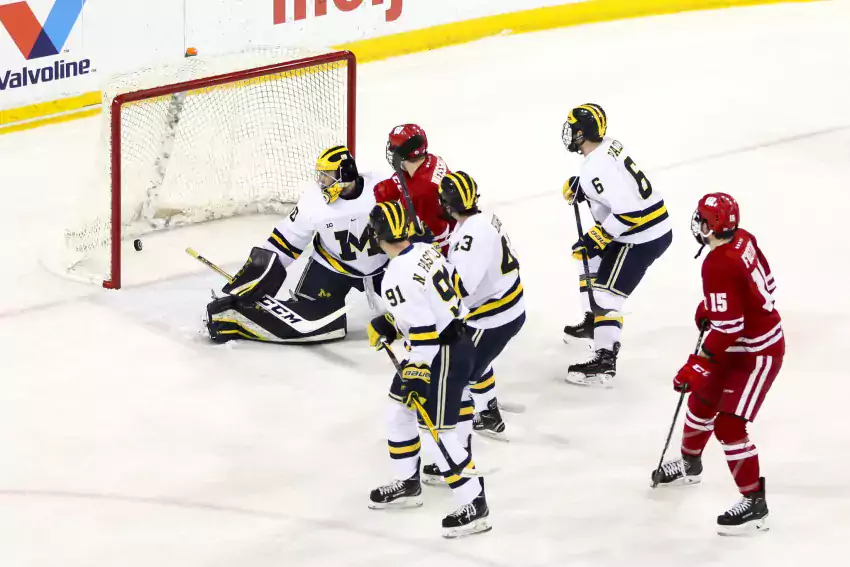
Hockey's season went out with a whimper as they were swept at the hands of Minnesota in the first round of the Big Ten tournament. That's disappointing but not particularly surprising for anyone who watched most of Michigan's season.
What went wrong? Michigan's various problems follow.
Age
Michigan was one of the youngest teams in the country, and the bottom of the age standings are pretty ugly:
ND and Denver are in the top 16 of the pairwise. Otherwise this is a list of the teams that generally recruit the best across college hockey and are struggling in the new over-30 NCAA. Not one of Minnesota, Michigan, BC, BU, or Wisconsin is in position for an at-large bid. It should be noted that 50-52 are Quinnipiac, Providence, and Harvard, who are all set for at-large bids, but even those teams in close proximity by rank are almost a half-year older than Michigan and the rest of the "we recruit the NTDP" class.
Under Pearson they've moved to taking more overagers, but those guys are all underclassmen. Michigan is in the process of having some 23 and 24 year olds; they are not there yet. At some point Michigan's going to be a mix of older players and high-level NHL prospects. Currently they are young and had 1.5 high-level prospects. Speaking of:
Talent level
Norris was M's only PPG scorer and missed half the year [Bill Rapai]
As discussed in the previous post about Michigan's gap year, this year's freshman class had zero drafted players for the first time in probably 20 years. Michigan found a good fourth line as Moyle and Van Whye emerged midseason; that line then became their de facto second line because nobody else was doing anything. Compounding matters was the previous class, which was Hughes and Norris (woot woot!) plus Mike Pastujov, whose star fell precipitously after his commitment, and then whatever Mel could scrape up. That turned out to be Becker and Raabe, two guys who have chipped in but aren't scoring line players at this point in their career.
So when Norris goes out midseason, they have zero underclassman forwards capable of playing on a scoring line. This is untenable for a program that is constantly getting raided by the NHL—you aren't getting Cooper Marody back for a senior year.
Michigan did have some guys: Lockwood put up 31 points in 36 games; Slaker and Pastujov put up 25 and 24. It's not a coincidence that two of the three top scorers were older draftees. There just weren't enough of them. Michigan has always been more talented than all of its opponents, which is how they make up the perpetual age gap. This year they weren't. Opposing goaltenders put up a .914; Michigan was 41st in shooting percentage. Even more telling: Michigan's power play conversion rate nearly halved from 19% (average-ish) to 10% (national worst) when Norris went out.
[After THE JUMP: woe! fie and woe!]
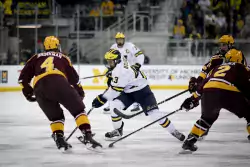
A look at two important factors in Michigan's final four regular-season games
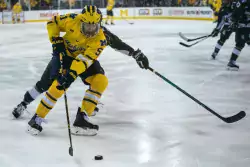
Takeaways from Michigan's split with the nation's fourth-ranked team
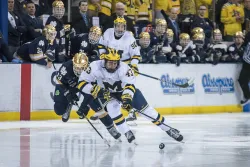
From Wedgewood Park's outdoor rink to Yost, the places and people that shaped the game and personality of Michigan's most recent top-ten pick

Jared Wangler was gunned down by a comically one-dimensional villain in the cold open to this post
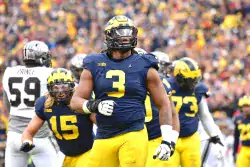
"so here's the thing about this monkey... he's really good at stocks"
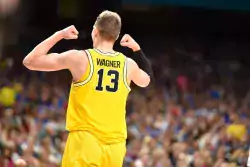
ESPN lives! For basketball at least! Moe Wagner has a bad day! Poole is on NBA draft radars! Please, Vancouver, give me one more year of Quinn Hughes, I beg you!

fullbacks are discussed. hog maps are linked. a penguin is explained. departures are unofficial. cornerbacks are good at cornerbackery. a seal is befriended, but not by the penguin.
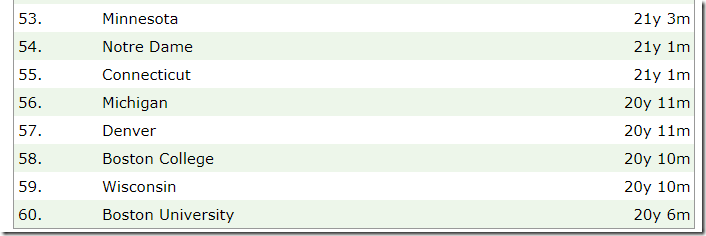
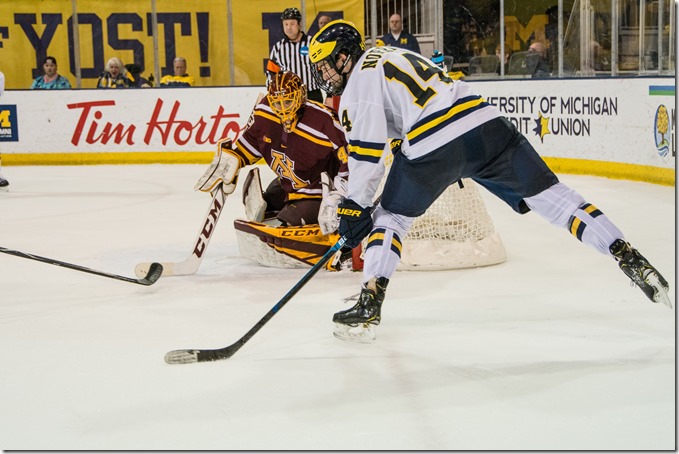
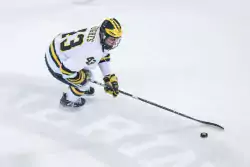
4